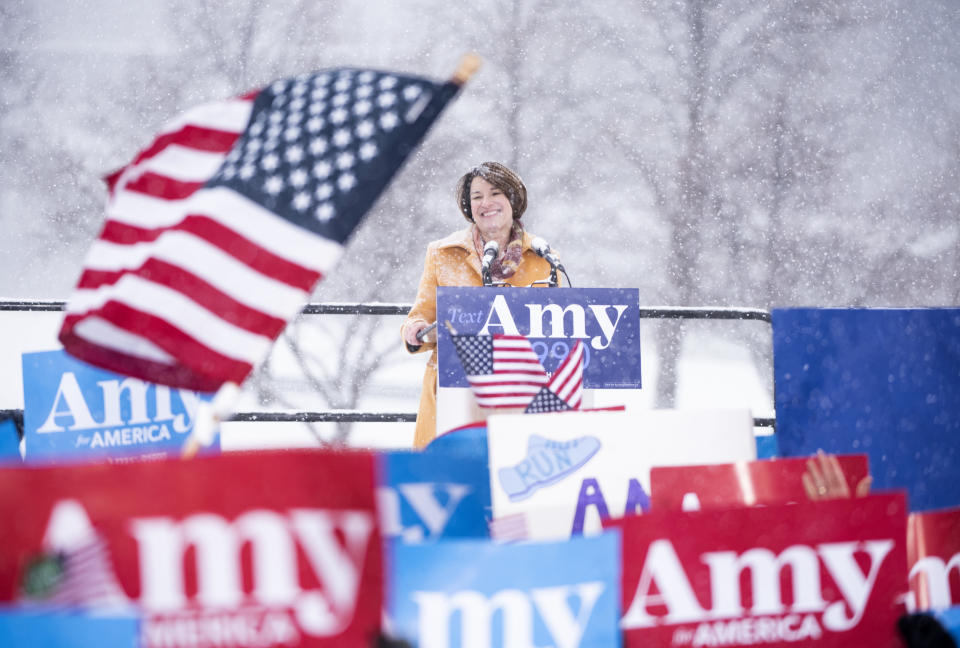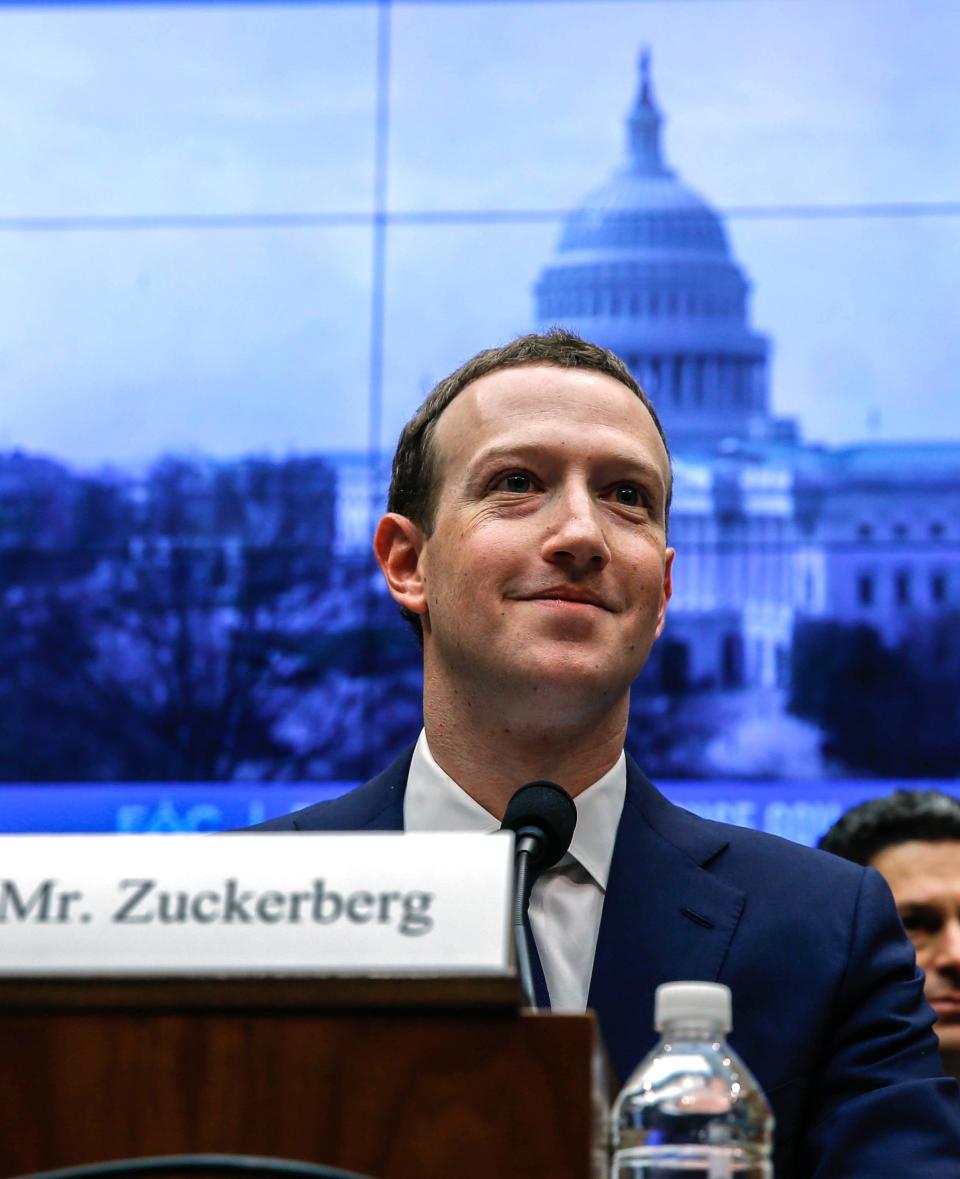It Won't Be A Lovefest For Democrats And Silicon Valley in 2020
When Sen. Amy Klobuchar (D-Minn.) announced her candidacy for the 2020 Democratic Party presidential nomination, she did something that would have been unheard of in previous election cycles: She explicitly criticized Silicon Valley’s big technology companies.
“For too long the big tech companies have been telling you, ‘Don’t worry! We’ve got your back!’ while your identities are being stolen and your data is mined,” Klobuchar said.
She isn’t the only Democrat running for president with a critique of Big Tech. In fact, every major 2020 Democratic presidential candidate has issued some form of statement critical of the industry or introduced legislation that would crack down on its most abusive practices.
That’s a huge shift for a party whose leaders have spent the last 30 years basking in the glow of the valley’s mythology of innovation and entrepreneurship, courting tech titans for their support and campaign contributions. It’s a marriage that reached its peak during the presidency of Barack Obama.

Obama was the first president who really got Silicon Valley ― and Silicon Valley got him. He brought tech insiders to Washington to bring their new ideas into government and streamline inefficient and outdated government technology infrastructure. And political hands went through the revolving door to work for those same tech companies.
Hillary Clinton, Obama’s first secretary of state and the 2016 Democratic presidential nominee, made technology and the internet a central part of her foreign policy, advocating that tech adoption would advance democracy. Her presidential campaign’s tech policy was a “love letter to Silicon Valley,” according to Recode.
“Now, that’s over,” said Matt Stoller, a fellow at the Open Markets Institute, an anti-monopoly think tank that has called for the government to break up Google, Facebook and Amazon. “Nobody thinks Big Tech is generally good ― or everybody has to at least acknowledge that they’re a problem. Nobody can say we need more Google in government.”
The Democratic Party’s diversion from Silicon Valley veneration to pointed criticism has coincided with a so-called “Techlash” ― the public backlash against tech industry abuses of user privacy, consumer protection and, most importantly, their market position.
Congress has spotlighted these abuses in a series of hearings over the past two years. Facebook CEO Mark Zuckerberg, Twitter CEO Jack Dorsey, Google CEO Sundar Pichai and other top executives faced questions from lawmakers about a range of issues, from foreign countries using their platforms to manipulate U.S. political sentiment to the failure to protect user privacy to whether or not the companies constituted monopolies.
Sen. Elizabeth Warren (D-Mass.), one leading Democratic presidential candidate, was out ahead of the pack in 2016 with a stinging critique of Big Tech.
She criticized Google, Apple and Amazon for using their platforms as “a tool to snuff out competition” and compared the tech giants to “too big to fail” financial institutions at an event at the New America Foundation, the Google-funded think tank whose then-chairman was ex-Google CEO Eric Schmidt. The speech launched a row where Google complained to the think tank about the speech and eventually led to the expulsion of antitrust scholars there who would go on to found the Open Markets Institute.
Warren’s call for greater antitrust scrutiny of giant tech companies helped inform the Democratic Party’s adoption of anti-monopoly policies in its 2018 campaign platform. And many of her fellow candidates have since echoed her concerns.
Klobuchar has led on these anti-monopoly issues in the Senate from her perch as the ranking member on the antitrust subcommittee. She introduced legislation in 2017 that would ban companies with market capitalization above $100 billion from making any new acquisitions. While not specifically targeting Silicon Valley, the market cap limit in her bill would include the Big Four tech giants ― Google, Apple, Amazon and Facebook.
Sen. Bernie Sanders (I-Vt.), who announced his presidential bid on Tuesday, previously released a set of videos featuring Stacy Mitchell, an antitrust expert at the Institute for Local Self-Reliance, explaining the impact of Amazon’s monopoly power.
Even 2020 candidates with strong tech ties like Sen. Cory Booker (D-N.J.) have changed their tone. Booker has close ties to the industry from his time at Stanford University, raised $100 million in charitable donations from Facebook’s Zuckerberg to the Newark public school system, and previously ran a tech start-up. But he is now calling for regulators to consider breaking up companies like Google and criticized Amazon’s acquisition of Whole Foods.

“The U.S. government should be far more active in antitrust actions because when they have taken actions, it’s often created collateral benefits to society,” Booker said in a 2017 interview.
It’s not just monopoly concerns that 2020 candidates are focusing on in their critiques of Big Tech.
Klobuchar crafted a bipartisan data privacy bill with Sen. John Kennedy (R-La.) and alongside Sen. Mark Warner (D-Va.) introduced the Honest Ads Act, which would require social platforms to disclose political advertising.
Sanders targeted Amazon for failing to pay its workers a living wage with legislation pointedly named after the company’s CEO Jeff Bezos. One month after Sanders introduced the bill, Amazon announced it would pay its warehouse workers a $15 minimum wage.
Sen. Kirsten Gillibrand (D-N.Y.) opposed New York giving Amazon tax breaks to locate a new headquarters in Queens. Amazon canceled the deal amid intense local opposition.
And Sen. Kamala Harris (D-Calif.) has raised concerns about federal police and immigration agencies that use facial recognition technologies. She also grilled Facebook Chief Operating Officer Sheryl Sandberg last year over the social media giant’s inability to police hate speech and white supremacy on its platform.
That exchange drew attention to Facebook’s inability to fully grasp how its desire to promote the most engaging content to users could be easily gamed by people promoting white supremacy or other hate-filled ideologies.
It was also symbolic of the changing relationship of the Democratic Party and Silicon Valley: a northern California senator chastising a powerful tech executive who just two years prior had been on Clinton’s shortlist for secretary of the treasury.
Love HuffPost? Become a founding member of HuffPost Plus today.
This article originally appeared on HuffPost.

